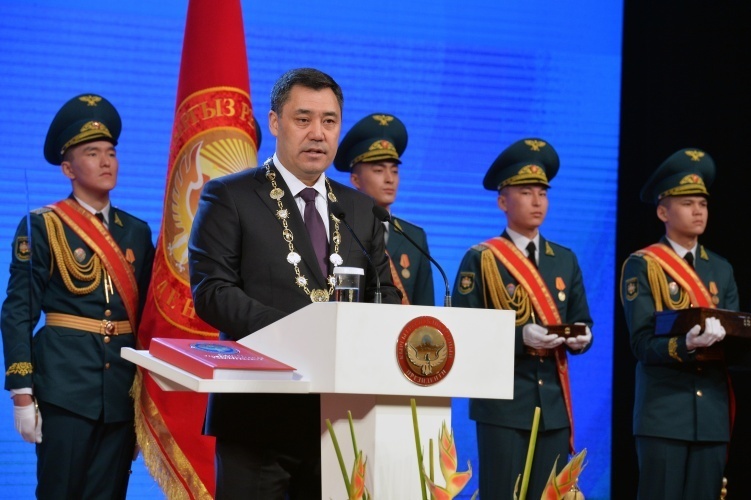Sadyr Japarov took office as president of Kyrgyzstan this Thursday. He is the country’s sixth president and the third to come to power following political uprisings. His political career began with the first Kyrgyz revolution and has always been accompanied by unrest.
This article was originally published on Novastan’s German website on 28 January 2021.
Sadyr Japarov officially became the sixth president of Kyrgyzstan on 28 January 2021. Elected on 10 January, the new leader of Central Asia’s most democratic state said he was opening “a new page of history”.
The new president’s political history started 16 years ago. In February 2005, in the run-up to the Kyrgyz parliamentary elections, angry demonstrators blocked key roads in the Issyk-Kul region to protest the withdrawal of several opposition politicians’ candidacies. In one case, they succeeded: “The electoral commission reinstated the previously withdrawn candidate for the Tüp constituency, Sadyr Japarov. His supporters went home and unblocked the road,” wrote the Vecherniy Bishkek daily newspaper. The article considers “a dangerous precedent had been set,” as it could encourage others to pursue a “policy of extortion through road blockades“.
Want more Central Asia in your inbox? Subscribe to our newsletter here.
Japarov won the constituency and obtained his first mandate. For him, it was a victory of “the people”, as he explained in his autobiography, published in 2015: “Truth only triumphed thanks to the strength of the people. That justice was a particular happiness for me.” Shortly after the first session of the new parliament, President Askar Akaev was overthrown by the “Tulip Revolution“. In early April 2005, he signed his resignation in the Kyrgyz embassy in Moscow. Japarov was part of the parliamentary delegation that negotiated with him.
In retrospect, the beginning of Japarov’s political career seems like a rehearsal of the events that would take him to high office over 15 years later. Pressure from the street, constant references to the “Kyrgyz people” and violence are recurring themes. As is Japarov’s determination, reflected in the term “dakansa”, widespread on social media in recent months – a humorous simplification of the Russian “do kontsa”, “to the end”.
From business to politics
Sadyr Japarov was born in December 1968 in the Issyk-Kul region, near the Soviet-Chinese border. His parents had returned from China six years earlier, where they had gone to flee Stalinist repression in the 1930s, according to Radio Azattyk, RFE/RL’s Kyrgyz service. Japarov grew up with ten other siblings in a shepherd family.
In 1987 he began his studies Kyrgyz State Institute of Physical Culture in Bishkek, the capital (then known as Frunze), and at the same time worked at a collective farm in the Chüy region until 1995. He graduated as a trainer in 1991. That same year he married Aygül Asanbaeva, with whom he has four children. He had before that done his military service at the Telegraph Office in Novosibirsk, in Russia. In 2006, he completed a law degree at the Kyrgyz Russian Slavic University in Bishkek.
Before entering politics, Japarov was mainly active as a businessman in the fields of agriculture and oil. Between 2002 and 2005 he managed the Nurneftegas oil company in Balykchy, on Lake Issyk-Kul. Another oil company, Issyk-Nar-Neft, is still registered in his name. According to the online publication Kaktus.media, it has been inactive since 2003.
Japarov’s first mandate lasted until the end of 2007, when Kyrgyzstan’s parliament was dissolved after the then president Kurmanbek Bakiev initiated a constitutional amendment. Japarov’s long-term friendship with the current head of the security services, Kamchybek Tashiev, also dates from that time. In September 2006, Vecherniy Bishkek reported the story of how, one night, the two lawmakers had fought for over an hour with a group of young people who were trying to ambush them. It wasn’t to be their last fight. According to media reports, they also settled their differences with the then mayor of Osh Melis Myrzakmatov and, later, with the MP Altynbek Sulaymanov with their fists.
Head of the anti-corruption agency
In the 2007 parliamentary elections, Japarov stood for the Ak-Jol party, founded by the then president Bakiev, but turned down a role as presidential advisor. The following year, he became head, or “commissioner”, of the National Agency for the Prevention of Corruption. In this role, he occasionally presented “The Commissioner Warns”, a show on public television reporting cases of corruption, sometimes with a hidden camera. After half a year, the program was cancelled by the broadcaster. Japarov also created a council of foreign businessmen to support the government’s anti-corruption work.
During Bakiev’s presidency, Kyrgyzstan was among the 20 most corrupt countries in the world according to Transparency International’s Corruption Perceptions Index (in 2019, it was 126th out of 180). “We have to face international propaganda and oppose it ideologically; it creates a negative image through ratings like these, which are often mentioned in local media,” Japarov said at the time.
In his autobiography, he explains the agency’s poor results by its lack of power: “The title ‘Commissioner” sounds powerful, but we had no right to search any place, to investigate criminals. Still, we got to the heart of the matter, we worked with other law enforcement agencies.”
The “famous gold conflict expert”
After a second revolution ousted Bakiev in April 2010, Japarov stayed in his position until July. In October that same year, he was alongside Tashiev among the founding members of the nationalist party Ata-Jurt (Fatherland). Ata-Jurt surprisingly came first in a parliamentary election not long after, with a little more than 15% of the vote. Japarov and Tashiev later switched to the Mekenchil (Patriot) party, which they are still part of to this day.
After lengthy negotiations, Ata-Jurt formed a coalition government with two other parties, and Japarov became head of the Committee on Judicial and Legal Affairs. In this role, he mainly advocated a reform in how judges are selected in order to put an end to corruption in the judiciary. However, his work was controversial as he and his political opponents accused each other of illegal acts. In an open letter, the then interim president Rosa Otunbaeva noted the “persistence and determination of the сhairman of the Committee on Judicial and Legal Affairs, Sadyr Japarov … in trying to get candidates presented and rejected by the president elected as judges. It’s obvious that such a decision violates the main principle of the law “On the council for the Selection of Judges” – its independence.”
In 2012, Japarov turned his attention to another hot topic: the nationalisation of Kumtör, the largest gold mine in Central Asia. The question of nationalisation has been a political issue since the mine’s development in the 1990s. According to a framework agreement from 1992, the Kyrgyz Republic initially owned two thirds of the shares in the joint holding Kumtor Gold Company. However, after a new agreement in 2009, the state’s share fell to a third.
It is precisely against this restructuring that the nationalist movements Sadyr Japarov was part of protested. The politician, then described by Vecherniy Bishkek as “the rather famous gold conflict expert”, was appointed head of a parliamentary commission on Kumtör. In early October 2012, Japarov and Tashiev called for a demonstration for the nationalisation of Kumtör. The initially peaceful protests turned into a perceived coup attempt when demonstrators attempted to storm the nearby White House, the presidential and parliament building, with success.
The researcher Asel Doolotkeldieva, who was at the time writing her thesis on social mobilisations in Kyrgyzstan, analysed the situation for the Institute for War and Peace Reporting in 2012. “When … Japarov announced early on in the October 3 rally that this was not about scoring political points, but was instead about real social and economic issues, it might have seemed for a moment that [Ata-Jurt] had moved on from personality-based politics,” she wrote. “But the ensuing events put an end to any such ideas, as indeed it did for the image he has tried to project of a mature, considered politician.”
From prison to exile…
Japarov, Tashiev and their party colleague Talant Mamytov were arrested and sentenced less than a year later for attempting to overthrow the government. They remained remained in jail for less than a year but lost their seats in parliament. Their trials were accompanied by loud, sometimes violent demonstrations by their supporters, some of whom exerted direct pressure on the judges.
The year 2013 in Kyrgyzstan was riddled with protests in various regions, leading to the declaration of a state of emergency but also a governor in southern Jalal-Abat being replaced by a self-proclaimed “people’s governor”. When the governor of the Issyk-Kul region was held hostage by demonstrators in October of that year, Japarov was accused of complicity and of financing the operation. He fled the country but it’s unclear where he went: sources mention Belarus, Russia, Cyprus and/or Kazakhstan.
In 2015, he published his autobiography Ten Years in Politics. It is a summary of ten years of Kyrgyz politics from the author’s point of view. What emerges is a self-portrait of Japarov as a politician working for the well-being of the people, always with a clear conscience. The book cover shows him smiling amid a group of supporters. In places the text reads like an indictment of his opponents. “Even without this book, I have more enemies in politics than hair on my head. Because there were moments when I exposed the corruption of most of them, told them their inadequacies straight to their faces,” the introduction states. “Obviously, with the publication of this book, the number of my opponents will double.”
… to prison again
When Japarov returned to Kyrgyzstan in March 2017 to take part in the presidential election that autumn, he was arrested at the border. In August of the same year, he was sentenced to 11 years and six months’ imprisonment (later reduced to ten years) for the alleged participation in the kidnapping in 2013. The sentence led to frequent protests, most recently in March 2020.
As Japarov stated in an interview with the Russian newspaper Kommersant shortly after his election, he used the time in prison to “work with the people via social media”: “I created groups on Odnoklassniki, Facebook and Instagram. I collected contacts on Whatsapp and created more than 50 groups there – one of them contains 256 contacts. Through these groups I disseminated information about Kumtör, about my work. That’s how I reached the whole people in half a year.”
His time in prison also helped create the image of a politician who sacrificed a lot for the people. Shortly after his arrest in 2017, he attempted suicide. In addition, he lost one of his sons and his parents while in prison.
He also fills, with his references to “the common people”, an otherwise unoccupied political position, thus bolstering his popularity, especially among the country’s poorest.
From prison to the president’s office
The active, violent support base that has accompanied Japarov throughout his political career, combined with skillful political communication, also explain his meteoric rise in October 2020. After he was released from prison early on 6 October, he was able to rise to the top of the executive branch within two weeks.
Read more on Novastan: From prison to high office: Sadyr Japarov is Kyrgyzstan’s new prime minister
“Sadyr Japarov’s strategy to, first, remove the competitors from the October revolution, second, remove the incumbent president from power and, third, take control of the elite’s wider circles was really extraordinary,” Asel Doolotkeldieva told Novastan France. “He managed to very quickly monopolise the political space, in a matter of months”. In this way, a surprise candidate became a status quo candidate. He stayed away from television debates during the election campaign, dismissing them as places of defamation, and had by far the highest campaign budget.
At the polls in January, he received almost 80% of the votes cast, but with a turnout of 39,16%, the lowest for any presidential election in Kyrgyzstan since 1991.
Cui bono?
The rapid political rise of Japarov also raises the question of whether he and his team benefited from the support of third parties. Accusations usually either refer to the family of the former president Bakiyev or to organised crime. The former has been alleged several times by the presidential candidate Abdil Segizbaev. During the televised debate at the end of December, he brought up several events and scandals from Japarov’s political career, which, according to him, indicate loyalty to Bakiev.
Read more on Novastan: Kyrgyzstan elects Sadyr Japarov and opts for presidential government
Assumptions about Japarov’s connections to the underworld go back some years. At the end of 2011, the then interior minister Zarylbek Rysaliev accused Japarov of friendship with Kamchy Kolbaev, the head of a criminal network involved in drugs, arms and human trafficking according to the US government. In an interview in December 2020, Japarov said that he only knew Kolbaev from a criminal investigation in 2010. According to research carried out by a consortium of journalists for the Organized Crime and Corruption Reporting Project, there is also a connection between Kolbaev and the former customs official Raimbek Matraimov. The same journalistic project published an investigation alleging Matraimov had taken part in a large-scale money-laundering scheme.
Both Kolbayev and Matraimov were arrested as part of a series of filmed arrests. Some, like the former secretary of the Security Council Keneshbek Düyshöbaev, considered it a “theater show”, as Kloop.kg notes. Matraimov was released after promising repayment of nearly $24 million (£17.5 million). According to Sadyr Japarov, this was a “political decision”: from prison, he explained, these arrestees would not have paid a cent back.
“Be patient”
Even since he took over the executive, Japarov has called the fight against corruption his number one priority. As during his time as head of the parliamentary legal committee, he sees changing the country’s legal framework as a necessary condition. A new constitution and a “renewal of the state” represent about half of his official program.
The rest of the program is primarily a description of the problem and of Japarov’s goals, with only vague information about how to achieve said objectives. For example, the budget of the public health system is to be doubled, financed by reducing public administration. Social policy is hardly mentioned, but there is talk of reducing “administrative barriers” for the private sector. According to this programme, Japarov’s policy should hardly differ in content from that of his predecessors.
Read more on Novastan: Can Sadyr Japarov fulfil his promises?
There is also remarkable continuity in the prosecution of political opponents. Two opposition candidates, Abdil Segizbaev and Kursan Asanov, were arrested days before the presidential inauguration. However, if Japarov turns too many public figures against him without improving his electorate’s living conditions, he could put his own position at risk.
In a message on his Telegram channel on 25 January, he urged his fellow citizens to be patient: “Reforms will begin on January 28, the day I take office. A new government will be formed. There will be a new structure of government. A new constitution will be adopted in April. Then the new laws will come into force”, he wrote, asking his audience to refrain from vigilantism. “Only then will we begin to uproot corruption legally,” he explains. “You have endured it for 30 years, you can endure another six months!”
Florian Coppenrath
Founder of Novastan Deutsch
For more news and analysis from Central Asia, follow us on Twitter, Facebook, Telegram, Linkedin or Instagram.
 Rise and fall… and rise: the career of Kyrgyzstan’s Sadyr Japarov
Rise and fall… and rise: the career of Kyrgyzstan’s Sadyr Japarov 



